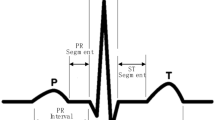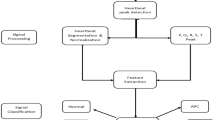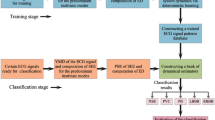Abstract
Cardiovascular disorders are known to be among the most severe diseases and the leading causes of mortality all over the globe. Premature ventricular contractions (PVC) are one of the most prevalent types of cardiac arrhythmia. Recording and analyzing electrocardiogram (ECG) signals is one of the most popular methods (the least intrusive and least expensive) for investigating cardiac disorders. In this study, a new supervised approach for the automated detection of PVC has been developed through a combination of handcrafted feature extraction from ECG signals and deep-learning-based feature reduction. The proposed approach utilized multiple methodologies, namely statistical and chaos analysis in the time domain and time–frequency domain, and morphological assessment, to extract numerous features from ECG signals. Then, a variational autoencoder network is developed as a deep learning-based feature reduction technique to reduce the number of extracted features and obtain the most discriminating features. Finally, a support vector machine, k-nearest neighbor, and neural network classifiers with fivefold cross-validation are utilized to classify ECG signals. The MIT-BIH database is used to evaluate the proposed approach. The numerical results show that the proposed approach performs better than the current state-of-the-art studies.






Similar content being viewed by others
Data availability
The dataset analyzed during the current study are available in (https://physionet.org/content/mitdb/1.0.0/).
References
R Allami 2019 Premature ventricular contraction analysis for real-time patient monitoring Biomed. Signal Process. Control 47 358 365
LD Avendano-Valencia JI Godino-Llorente M Blanco-Velasco G Castellanos-Dominguez 2010 Feature extraction from parametric time–frequency representations for heart murmur detection Ann. Biomed. Eng. 38 8 2716 2732
J Bernardi KA Aromolaran AS Aromolaran 2020 Neurological disorders and risk of arrhythmia Int. J. Mol. Sci. 22 1 188
AK Bhoi KS Sherpa B Khandelwal 2018 Arrhythmia and ischemia classification and clustering using QRS-ST-T (QT) analysis of electrocardiogram Cluster Comput. 21 1 1033 1044
Z Chen H Xu J Luo T Zhu J Meng 2018 Low-power perceptron model based ECG processor for premature ventricular contraction detection Microprocess. Microsyst. 59 29 36
A Chen Y Zhang M Zhang W Liu S Chang H Wang J He Q Huang 2020 A real time QRS detection algorithm based on ET and PD controlled threshold strategy Sensors 20 14 4003
S Ghodake S Ghumbre S Deshmukh 2020 Optimized cardiovascular disease detection and features extraction algorithms from ECG data Int. J. Adv. Comput. Sci. Appl. 11 8 200 206
V Gupta M Mittal V Mittal NK Saxena 2021 A critical review of feature extraction techniques for ECG signal analysis J. Inst. Eng. (India) Ser. B 102 5 1049 1060
T Ince S Kiranyaz M Gabbouj 2009 A generic and robust system for automated patient-specific classification of ECG signals IEEE Trans. Biomed. Eng. 56 5 1415 1426
R Jagannathan SA Patel MK Ali KMV Narayan 2019 Global updates on cardiovascular disease mortality trends and attribution of traditional risk factors Curr. Diab.Rep. 19 44
G Jothi J Akilandeswari S David Samuel Azariya A Naveenkumar 2022 Unsupervised feature selection approaches for medical dataset using soft computing techniques Evolut. Comput. Intell 267 105 114
A Kumar M Singh 2018 Statistical analysis of ST segments in ECG signals for detection of ischaemic episodes Transact. Inst. Meas. Control 40 3 819 830
H Li P Boulanger 2020 A survey of heart anomaly detection using ambulatory electrocardiogram (ECG) Sensors 20 5 1461
CC Lin HY Chang YH Huang CY Yeh 2019 A novel wavelet-based algorithm for detection of QRS complex Appl. Sci. 9 10 2142
CH Lin 2008 Frequency-domain features for ecg beat discrimination using grey relational analysis-based classifer Comput. Math. Appl. 55 4 680 690
AI Malakhov SI Schookin VI Ivancov AN Tikhomirov 2013 A combined algorithm for identification and differentiation of atrial flutter and atrial fibrillation based on ECG analysis Biomed. Eng. 47 14 17
BM Mathunjwa YT Lin CH Lin MF Abbod J Shingshieh 2021 ECG arrhythmia classification by using a recurrence plot and convolutional neural network Biomed. Signal Process. Control 64 102262
MH Mazidi M Eshghi MR Raoufy 2020 Detection of premature ventricular contraction (PVC) using linear and nonlinear techniques: an experimental study Clust. Comput. 23 2 759 774
GB Moody RG Mark 2001 The impact of the MIT-BIH arrhythmia database IEEE Eng. Med. Biol. Mag. 20 3 45 50
HC Nejad O Khayat J Razjouyan 2014 Chaotic feature extraction and neuro-fuzzy classifier for ECG signal characterization Biomed. Eng. Appl., Basis Commun. 26 03 1450038
MR Rajeshwari KS Kavitha 2022 Arrhythmia ventricular fibrillation classification on ECG signal using ensemble feature selection and deep neural network Clust. Comput. 25 5 1 18
DJ Rezende S Mohamed D Wierstra 2014 Stochastic backpropagation and approximate inference in deep generative models Int. Conf. Mach. Learn. 32 1278 1276
S Sahoo M Dash S Behera S Sabut 2020 Machine learning approach to detect cardiac arrhythmias in ECG signals: a survey Irbm 41 4 185 194
NT Sarshar M Mirzaei 2022 Premature ventricular contraction recognition based on a deep learning approach J. Healthc. Eng. 2022 1450723
SH Serhal N Abdallah JM Marion P Chauvet 2022 Overview on prediction, detection, and classification of atrial fibrillation using wavelets and AI on ECG Comput. Biol. Med. 142 105168
M Sraitih Y Jabrane A Hajjam El Hassani 2021 An automated system for ECG arrhythmia detection using machine learning techniques J. Clin. Med. 10 22 5450
J Wang 2021 Automated detection of premature ventricular contraction based on the improved gated recurrent unit network Comput. Methods Progr. Biomed. 208 106284
L Wang M Han X Li N Zhang H Cheng 2021 Review of classification methods on unbalanced data sets IEEE Access 9 64606 64628
C Xu C Sun G Jiang X Chen Q He P Xie 2020 Two-level multi-domain feature extraction on sparse representation for motor imagery classification Biomed. Signal Process. Control 62 102160
SN Yu MY Lee 2015 Wavelet-based multiscale sample entropy and chaotic features for congestive heart failure recognition using heart rate variability J. Med. Biol. Eng. 35 3 338 347
J Yu X Wang X Chen J Guo 2021 Automatic premature ventricular contraction detection using deep metric learning and KNN Biosensors 11 3 69
X Zhang M Shafiq G Zheng J Wan Z Sun 2021 Premature ventricular contractions’ detection based on active learning Sci. Program. 2021 1 14
F Zhou L Jin J Dong 2017 Premature ventricular contraction detection combining deep neural networks and rules inference Artif. Intell. Med. 79 42 51
Author information
Authors and Affiliations
Corresponding author
Ethics declarations
Conflict of interest
The authors declare that they have no conflict of interest.
Additional information
Publisher's Note
Springer Nature remains neutral with regard to jurisdictional claims in published maps and institutional affiliations.
Rights and permissions
Springer Nature or its licensor (e.g. a society or other partner) holds exclusive rights to this article under a publishing agreement with the author(s) or other rightsholder(s); author self-archiving of the accepted manuscript version of this article is solely governed by the terms of such publishing agreement and applicable law.
About this article
Cite this article
Ebrahimpoor, M., Taghizadeh, M., Fatehi, M.H. et al. Premature Ventricular Contractions Detection by Multi-Domain Feature Extraction and Auto-Encoder-based Feature Reduction. Circuits Syst Signal Process 43, 3279–3296 (2024). https://doi.org/10.1007/s00034-024-02613-5
Received:
Revised:
Accepted:
Published:
Issue Date:
DOI: https://doi.org/10.1007/s00034-024-02613-5




